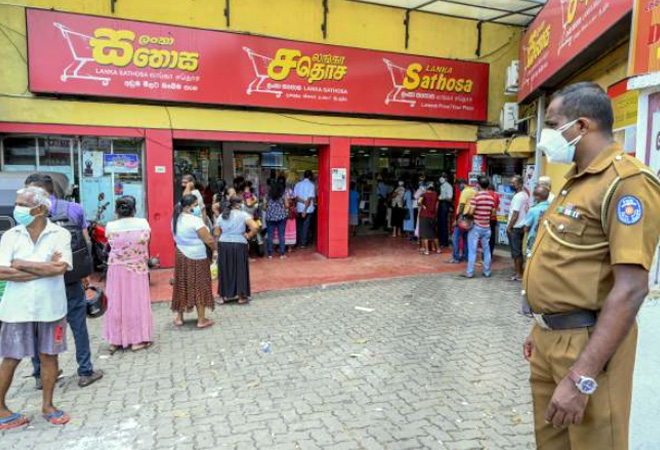Sri Lanka is experiencing acute food emergency. Long food queues are seen even in Colombo neighbourhoods amid tight lockdown measures. Shelves at government-run supermarkets are running low – some even empty. Imported goods like milk powder, cereal and rice are too scarce but the government denies shortages, blaming the media for stoking fears.
Declaration of Emergency: On August 30, 2021, Sri Lankan President Gotabaya Rajapaksa declared a state of emergency under the Public Security Ordinance (PSO) and had Proclamation on Emergency Regulations for Supply of Essential Foods on August 31. Using PSO government can prevent hoarding, seize stocks, fix selling prices and distribute essential food items at a “concessionary rate.” It appointed a former Army Major General as the Commissioner General of Essential Services to coordinate. On September 6 parliament approved the Regulations. Central Bank chief has stepped down amid foreign exchange crisis.
Criticism: The government blamed the “food mafia” but laws could monitor hoarding and price rise. Critics say emergency has been declared in “bad faith” to consolidate power, restrict fundamental rights and clamp authoritarianism as majoritarian government “had all the time in the world” to bring fresh legislation but delivered a “fully-fledged State of Emergency”.
Economic Crisis: The World Bank upgraded Sri Lanka-one of the strongest economies of South Asia – to an upper middle-income country in 2019. Now it grapples with a depreciating currency, inflation and foreign debt burden which has been growing from 39% of Gross National Income (GNI) in 2010 to 69% in 2019.
The genesis of the present crisis: The Covid-19 pandemic caused unprecedented disruption in Sri Lankan economy. Heavily dependent on tourism and tea exports traditionally, economy shrank 3.6 per cent in 2020, foreign exchange reserves dropped from $7.5 billion in November 2019 to $2.8 billion in July 2021, and rupee depreciated by 20 per cent against the US dollar. A strengthening dollar left less dollars to pay for imports.
The 2019 Easter Day bombings disrupted tourism industry-a primary source of foreign exchange-which declined from 10.4 per cent of GDP in 2019 to 4.9 per cent in 2020 due to Covid-19 crisis. Employment in tourism fell by 25 per cent; foreign visitors declined by three-fourths.
The economic policies and structural factors bred the crisis though Covid-19 amplified it. Foreign borrowings through sovereign bonds were excessive without matching FDIs and foreign funds (except in tourism) to meet rising debt obligations. The national debt soared from $48 billion in 2016 to $86 billion in 2021. Foreign reserves matched just three months of imports, but foreign debts of $3.7 billion in 2021 had to be repaid. Repayments became costlier when currency weakened against the dollar.
The extraordinary steps to save on precious foreign exchange reserves added automobile spare parts, dietary staple, turmeric, toothbrush handles, strawberries, vinegar and wet wipes to import embargo list. Rising fuel prices became added burden as foreign reserves are needed for purchases of essential medicines and vaccine. Government mulls fuel rationing.
Sri Lanka’s currency swap deals with China ($1.5 billion) and India ($400 million) allows temporarily reprieve but economy needed long-term or structural measures to tide over the economic crises.
Food Crisis resulted from Forex Problem: The food shortage is a reality now and has grabbed international headlines. Reliance on imports of essentials-petroleum, sugar, dairy products, wheat, medical supplies- fast-dwindled foreign reserves. The pandemic’s lethal blow to all major sources of foreign exchange earnings-exports, worker remittances and tourism-further exacerbated the economic stress.
To save precious foreign exchange Colombo banned imports of chemical fertilisers, pesticides and herbicides in March, to become the first country to grow only organic food henceforth. The rapid, overnight transition to organic fertilizers, and sudden mid-crop change without preparing the soil adequately threatened food security. A transition period of at least three years was not allowed The Productivity of organic fertiliser is less than chemical fertilisers which 90% of Lankan farmers of rice, rubber and tea used. Lanka’s well-known tea industry faced 50 % drop in production. The yields of vegetables and rice from the organic farming declined, increasing dependence on imports. In 2008, Bhutan introduced a policy to go 100% organic by 2020 but fell short! Sri Lanka’s case is similar. Prices of essential commodities-rice, dal, bread, sugar, vegetables, fish-multiplied during the pandemic. Daily-wage earners and low-income families could not afford milk, sugar. These Emergency regulations are not sustainable as Sri Lanka has no universal public distribution system and ration cards for equitable distribution. The government’s apparent policy ambivalence is creating black markets. Either allow the free-market mechanism or ensure distribution of essential foods.
The Central Bank of Sri Lanka printed of Rs 800 billion to ease economic crisis and liquidity but infusion of this money, and consequent increase in demand without a corresponding increase in supply led to inflation, devaluation of currency, rendered imports costlier, inflated the debt and put forex reserves under pressure.
The government fixing prices of all essential items has rendered traders reluctant to buy at high prices internationally, especially in a restrictive import licensing regime. The economic crisis has boiled over to food security affecting essential imported items – sugar, wheat, dairy products and medical supplies – which face growing supply problems.
(Source: New Delhi Times)

